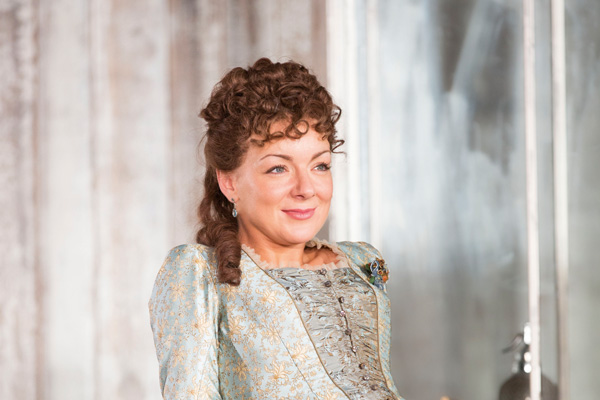The tone is the thing. Ibsen is among the heaviest of the heavy-going playwrights and his masterpiece, Hedda Gabler, is an unbearably tense psychological thriller that ends with one of the biggest shocks in the theatrical repertoire. The play takes us into a doomed marriage between Hedda, a brilliant and eccentric depressive, and George Tesman, a dull-as cheesecake university lecturer.
Director Anna Mackmin has read the Old Vic audience correctly. They’ve spent all day at the office, raising enough funds to buy tickets, and they’re not interested in a three-hour Nordic brain-bruiser. Instead, they want a frothy, offbeat marital comedy with a few sad bits. And that’s what they get. Mackmin has used Brian Friel’s interventionist script, which includes lots of gags and comic speeches that undermine Ibsen’s gravely emotive original. Lez Brotherston has recreated the Tesmans’ home from an elegant confection of whites and greys but with one ominous detail: there’s a pop-up glass kiosk in the middle of the living area, like an internal greenhouse surrounded by an outer sitting-room. Very odd. Surely this see-through box hasn’t been plonked there as a display case for the show’s violent climax?
Elsewhere, the production is marred by poor casting. Adrian Scarborough plays Tesman as an affable oaf with a silly hobby rather than as a formidable academic whose career has taken over his life. Sheridan Smith lacks the magnificent presence of Ibsen’s tragic heroine. Smith is winsome, sweet and funny but she hasn’t got the big notes for this role. Not hopeless, just oomph-less. Then we have Eilert Lövborg, the brooding genius, the wild-eyed sex athlete, the tormented philosopher who still pines despairingly for Hedda. And what does he look like? Well, he looks like Daniel Lapaine who appears to have ambled in from his other job running a hat shop. And there’s still that strange greenhouse thingie to worry about. I spent the last 20 minutes of the play trying to guess which pane of glass would receive the ketchup-and-pea-soup cluster bomb that goes off when the fatal shot is fired. This, I fear, was not Ibsen’s intention. And the audience at the Old Vic remained wholly unappreciative of Mackmin’s efforts to descend to their level. They kept up a passive-aggressive barrage of coughs and throat clearances throughout. Only two spectators, both seated behind me, caught the mood of frivolity as they sniggered and chortled uproariously at anything remotely amusing on stage. One of them was chomping through a plastic bag full of tightly wrapped sweets as well. The other was Kevin Spacey.
David Hare’s 1998 play The Judas Kiss examines two key moments in the later years of Oscar Wilde: his arrest at the Cadogan Hotel in 1895 and his spell in Naples with Bosie during 1897. In approaching this material, Hare has taken the sort of risk no sane dramatist should contemplate. He has written two hours of dialogue for Oscar Wilde. And the result is a triumph. Instead of creating a martyred wag, or a queeny poseur dropping epigrams, he’s performed a miraculous ‘mind-meld’ with his subject and produced an exquisitely detailed snapshot of genius in distress. Wilde is simple, noble, generous and fearless. He’s full of eccentric flourishes and mischievous, self-mocking wit. Above all, he’s animated by his magnetism and charm. Charm is often just greed for admirers but Wilde has something else, a magical inner luminescence, an irresistible desire to spread his joie de vivre as widely as possible. Even the servants at the Cadogan Hotel adore him. Instead of accepting his generous tips they hand them back and beg him to take them with him into exile.
Rupert Everett, in a faultless performance, captures all the complexity and depth, and all the brimming humour, of Hare’s beautiful portrait. There’s excellent support from Cal MacAninch as Wilde’s first lover, Robert Ross, and from Alister Cameron as a discreetly gay hotel butler. I even found myself warming to Dale Ferguson’s low-budget set, which can’t stretch to a carpet for the Cadogan Hotel and makes do with a velvet drape spread over the boards.
Bosie is played by Freddie Fox who, in real life, is very young, very beautiful, very successful and very well connected. He does well to bring out the shrill, brattish naivety of the young peer but he can’t find much tenderness or sympathy in him. And he tends to SCREAM when registering high emotion, and to signal with his hands information that the text is already conveying. But it’s early days for Fox. Obviously, he’s going to be a big star and celluloid may suit him better than the stage. Film directors will force him to remain still and to do everything with his eyes. This excellent piece of theatre deserves an outing in the West End. Let’s hope Rupert Everett has space in his diary.






Comments